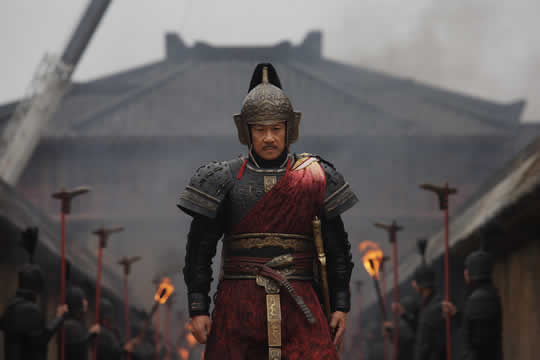 Chen Kaige, arguably the most noted of the Fifth Generation of Chinese filmmakers, lived through the Cultural Revolution. Shame at some of his actions as a Red Guard, including denouncing his filmmaker father Chen Huai’ai (“Song Of Youth”) marked his filmmaking ever since. His prizewinning films the decades-spanning “Farewell My Concubine” ( 1993 Cannes Palme d’Or ) and “Together” explored the Cultural Revolution and father-son issues.
Chen Kaige, arguably the most noted of the Fifth Generation of Chinese filmmakers, lived through the Cultural Revolution. Shame at some of his actions as a Red Guard, including denouncing his filmmaker father Chen Huai’ai (“Song Of Youth”) marked his filmmaking ever since. His prizewinning films the decades-spanning “Farewell My Concubine” ( 1993 Cannes Palme d’Or ) and “Together” explored the Cultural Revolution and father-son issues.
Working under the dictates of the official Chinese Film Industry, which forbids criticizing the current political regime, Chen Kaige’s “Sacrifice” tales place in Spring and Autumn period Of China’s history (771-476/403 BC) in the Opulent Yuan Dynasty.
The story of exceedingly patient revenge is adapted from the classic play, the Orphan of Zhao. Ji Junxiang’s play was the earliest known Chinese drama in the west. Translated into French by Father Joseph Henri Marie de Prémarein 1731, it inspired many translations and was adapted by Voltaire as “L’Orphelin de la Chine.”
The father-son triangle at the heart of the surprisingly intimate story touches on the sorrows of China’s one-child policy and subverts the original play’s feudal intent into something more timeless.
The powerful Zhao clan has wielded power over the king and his nobles for generations. Ling Gong (Peng Bo), the fey, childless ruler has married his sister Princess Zhuangji (Fan Bingbing-“Bodyguards and Assassins”) to the favored warrior young Gen. Zhao Shuo. Raging at being sidelined and lusting after the beautiful Princess, ruthless General Tu’an Gu (Wang Xue Qi-“Warriors of Heaven and Earth” ) poisons LIng Gong, laying the blame on the Zhao. He takes power in a well staged coup, massacres the clan and sends Han Jue (Huang Xiaoming -“The Banquet”) and his men to find the pregnant Princess and murder her baby.
Loyal Dr.Cheng Ying (You Ge'”Let the Bullets Fly”, “The Banquet”) delivers the last Zhou child. Han Jue arrives. The Princess implores him to spare her child, who she vows will be brought up as an ordinary boy, far from the corridors of power. She stuff’s her gown and begs Han Jue to say that he found her dead and pregnant body.
Before she suicides, the Princess entrusts Dr. Cheng Yin to bring the child to safety with her family friend Gongsun Chujiu. 
Discovering the Princess’s ruse, Like Pontius Pilate before him, Zhao Shuo orders all the newborn babies in the city to be taken, hoping to identify the missing Zhao heir. With the city gates closed, Dr Yin leaves the baby with his wife. She surrenders the prince to Tu’an Gu’s men and saves their baby.
Distraught Dr. Yin leaves her and the prince at Gongsun Chujiu’s house and attempts to recover the prince. When General Tu’an Gu mistakes his son for the prince and murders his wife and child, Dr. Yin raises the boy to avenge the murder.
Humbling himself he joins General Tu’an Gu’s retinue and asks the aging general to serve as godfather to his motherless boy Cheng Bo (William Wang and Zhao Wenhao). The childless General dotes on the boy, raising him as a warrior. Subverting his father’s rules, he spoils Cheng Bo all the better for the doctor’s plan) and teaches him to be the best warrior in the land.
Dr. Yin and his secret friend (the wounded sorrowful Han Jue) raise the cuckoo to strike at the heart of the Zhoa’s enemy, but intriguing melodramatic plot points lift the story into the realm of Iron John’s menhood issues before the final fight scene.
Unlike Chen Kaige’s lushly epic earlier films, this historic revenge story becomes a carefully crafted meditation on father and son (and god-father and “son”) relations, almost a three-handed chamber piece set in Dr. Yin’s humble abode and the surrounding streets. Even the scenes in General Tu’an Gu’s palace feel relatively intimate.
Yang Shu’s exquisite cinematography, Tian Xiaoxian’s subtle art direction, and costumes by Liu Qing, Yao Yuanchao and Liu Xiaohong give a detailed richness to the tale movingly underscored Ma Shangyou (“Beginning of the Great Revival”) and Shi Yang.

